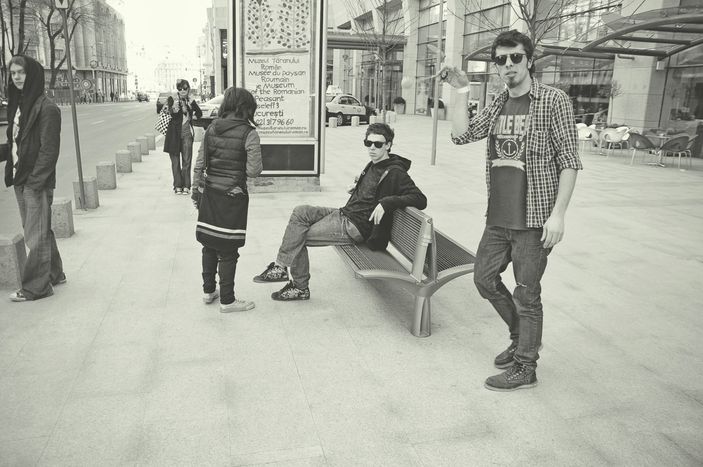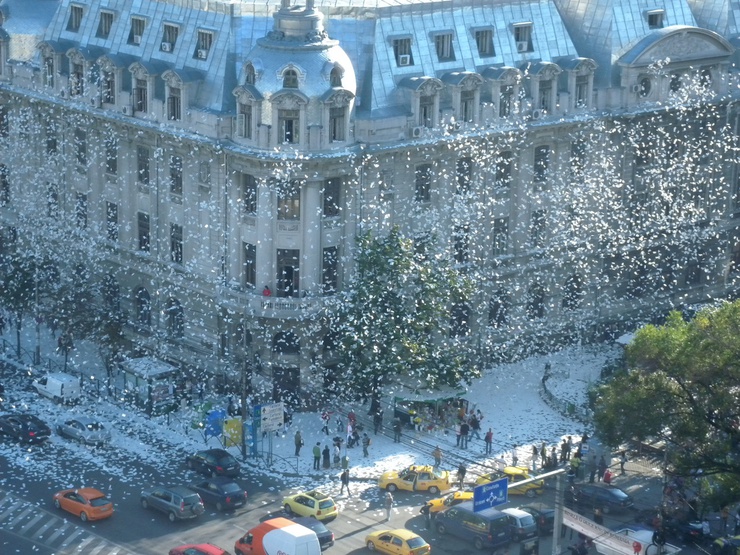
Protests in Bucharest: Romanians, 'not like Greeks'
Published on
On 25 June, 600 protestors tried to storm the presidential palace to stop massive cuts in public wages and pensions, severe austerity measures due to the financial crisis. I witnessed the first protest in May, where many stayed home. Students, professors and journalists in Bucharest speak
Amidst blue, red and white flags on the crossroads of Victoriei Square, an elderly man strides past with a t-shirt on a wooden stick. I don’t need sex. The government fucks me every day. For what was hailed as the largest protest in Romania since the fall of communism, around 5, 000 people gathered in Bucharest on 19 May 2010. Five Romanian trade union confederations organised bus transport to the city centre for those from more distant parts of the country and neighbouring Moldova. Students, police officers, government functionaries, engineers, teachers, doctors, mothers, pensioners protested peacefully. These are the Romanians who would directly suffer from austerity measures which will cut or reduce scholarships, salaries, pensions and child allowances by between 15 % and 25%, as well as jobs in the public sector. Some think that the worse is about to come during winter, when the heating and electricity bills will no longer be partially sustained by the government, but be fully paid by the citizens. All this to keep the budget deficit at 6.8% of GDP (between Germany at 5.5%, Spain at 10% and Greece at 13%; the EU limit is 3%).
Protest culture Bucharest
The May protest lacked conviction though. People seemed to be both committed to the yet equally discrediting of its success. After the allowed duration of two hours in front of the government building, the square emptied incredibly fast. There wasn’t even enough rubbish to collect. For many the day was remarkable in itself for being the biggest protest after the democratic revolution, nearly two decades previous; from 13 - 15 June 1990, the peaceful anti-communist protest against Romania's first freely elected government was brutally crushed by miners, where six died and over 700 were injured. One young woman remembers how exceptional the camp-in protests outside the university were when she was a child, sleeping in a tent, on University square. George Propescu, who teaches media at the university of Bucharest, reminds us that Romanians have 45 years of experience of suffering. 'Romanians like to accept, follow the steps, be slaves,' says the 34-year-old at the city's largest shopping centre. 'People are much more active when they talk and share views than actually going to the protest, where they couldn’t find themselves.'

Alexandra's salary as communications officer at Bucharest university will be cut by 15%. In one of the quiet university offices, the 24-year-old explains why she didn't attend the protest a few days previous. 'It wouldn't have made any difference. We're not like the Greeks. We don't make an impact.' Romanian students today are not the ones of 1989. Politicians can focus more on their bank accounts in the knowledge that their people would never start a ‘second revolution’, a term that a lot of the protesters threw around. 'The president and the government know that they can do whatever they want and remain unpunished,' is the official word on the street. Architecture student Cristi, 22, chain smokes as he wait for a friend after the protest. 'The problem in Romania is the mafia, which is the government. You come from Bulgaria - you should already know. Other types of mafia steal and kill but do not make the law. The government is taking these measures because they are incapable of stealing from anywhere else.'
Alternative solutions
However, Romanians do talk. They do know about what's going on in several cases of corruption. For example, large profits disappeared mysteriously from a profitable postal company, which one interviewee calls 'a cow to be milked'. Then there's the American company Bechtel which never completed the highway it was paid for. 'The media goes with the government, the actual mafia is the government, and people hope that the European Union will do something to help them,' says one exiting student protestor. The EU is an achievement of the country, not of the prime minister, but no help is coming, as many hope. The government’s control of the media and lack of the right communication methods leads society deeper into a domino effect crisis with no end: one which downs economic, political, social and personal tiles in a row.
'A government composed of technocrats is the best option to lead us out of this crisis'
Irina, 23, works for an Ngo calledFacias NGO, which echoed the international monetary fund (IMF) in suggesting more taxes for higher incomes and luxury objects (yachts, limos) and lower taxes for food and poorer incomes. Cutting 25% of a representative’s salary is not the same as cutting 25% from a teacher’s salary. With more control, billions could be recovered from the Romanian underground economy, which appears to be composed of cigarettes and alcohol. Tourism is another forgotten golden nugget. If the Romanians aren't protesting, is it because they are all at the seaside? 'This government is unprepared, unqualified, inexperienced and says one thing whilst doing another,' complains Irina. 'A government composed of technocrats is the best option to lead us out of this crisis. Technocrats are specialised, experienced and successful in their fields. Some of them teach and denounce government’s actions; brought together they may be able to make a change. There is always a solution for any problem, the question is in the choice of the people: if they want to keep talking or to start protesting.'
Image: main, youth of Bucharest©wealldo/ university protest ©Em and Ernie/ both courtesy of Flickr/ video: ©nocommenttv/ Youtube



